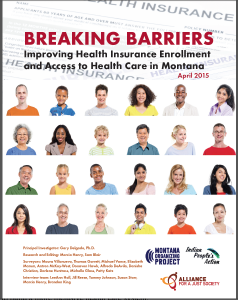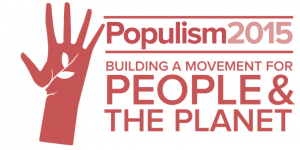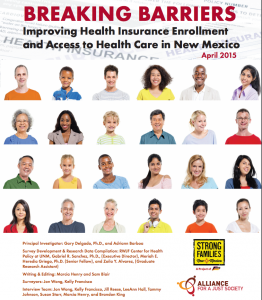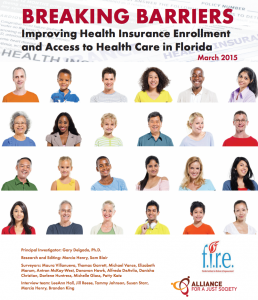As more families get health insurance, it’s becoming clear that despite the many advances of the Affordable Care Act, we must do more to fundamentally change our health care system. The doors of quality health care are still closed to many people of color, families in rural communities, the poor, and those with language and cultural barriers.
“Breaking Barriers: Improving health insurance enrollment and access to health care,” is a year-long study that includes a survey of nearly 1,200 low-income people in 10 states in Spanish, Cantonese, and English. They were contacted at food pantries, health clinics, homeless centers, and other locations.
“The Alliance for a Just Society works with partners nationwide who have low income members directly impacted by our health care system, “ said LeeAnn Hall, executive director of the Alliance for a Just Society, which released the report today. “We will continue to fight to see that disparities are addressed and that these recommendations are put in place.”
Report author Gary Delgado is a visiting scholar at the University of California, Berkeley’s Institute of Social Change and a longtime civil and human rights leader.
The report details continuing barriers to enrollment and the glaring racial disparities in receiving health care that are magnified as more people gain health insurance. Significant changes need to be made to the system. “Breaking Barriers” includes 20 specific recommendations.
“The Affordable Care Act is a big, new house built on the old foundation,” said Delgado. “We’re still not serving people of color. We need to build a more inclusive health care system.”
While failure to expand Medicaid in 22 states is the biggest barrier to ending disparities in health care, it’s not the only obstacle. For many, cost, lack of technology, language access, and the complexities of health insurance make both enrolling and getting care difficult.
Of those surveyed, 45 percent said they live with a chronic condition. In addition, 54 percent of people of color said they use the hospital or clinic for their primary care.
“One woman told me it sometimes comes down to deciding between medication and food. Her credit is bad because of her high prescription costs,” said Adriann Barboa, of Strong Families New Mexico.
Especially in communities of color and in rural towns, a lack of Internet service is a significant barrier, to signing up for coverage, receiving updates and notices about plans, and paying premiums.
In the “Breaking Barriers” survey, 41.6 percent of Latinos and 47.7 percent of African Americans said they have Internet at home, compared to 77.5 percent of white people asked.
Antron McKay-West, with Upgrade Mississippi, grew up in the Mississippi Delta.
“It is so rural, most people can’t imagine life there. Most people don’t have Internet, if they do, it is very slow, it’s not the technology most are used to,” he said.
“During enrollment, some people were told to just go to the library and use the Internet. In the neighborhood where I grew up, the library is 15 miles away,” said McKay-West.
Nearly 200 organizations from around the country have joined with the Alliance for a Just Society in endorsing recommendations in the report for making sure everyone has access to quality health care.
Recommendations include:
- Expand Medicaid in the 22 states that have refused to accept federal funding, leaving millions of low-income workers with out health insurance.
- Expand the role of navigators to help people move from coverage to care.Navigators will teach those with coverage about personal doctors, routine tests, annual checkups and other aspects of health care.
- Measure results: Require plans to track health outcomes, disaggregated by race, ethnicity, primary language, gender, disability, and sexual orientation.
- Strengthen community-based health care. Expand school-based health centers in medically under-served communities. Support community providers including clinics, individual physicians, and small community practices.
- Expand medical-legal partnerships to address issues that lead to poor health in low-income communities such as mold in housing, contamination, and industrial pollutants.
- Enforce access to preventive care. Ensure that all health plans cover yearly check-ups, immunizations, and screenings at no out-of-pocket cost.
Alliance for a Just Society is a national organizing and research network that has produced pivotal reports for 20 years on state and national health issues including Medicaid, prescription drugs, and insurance industry practices.





